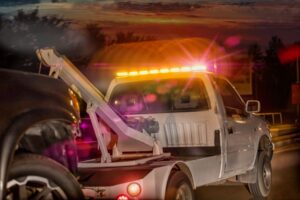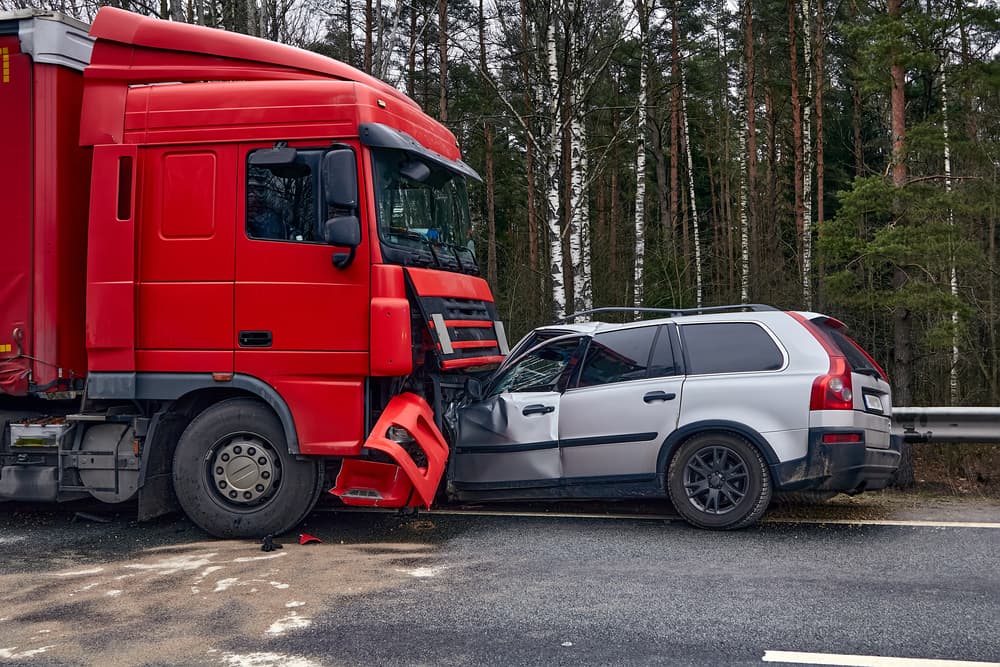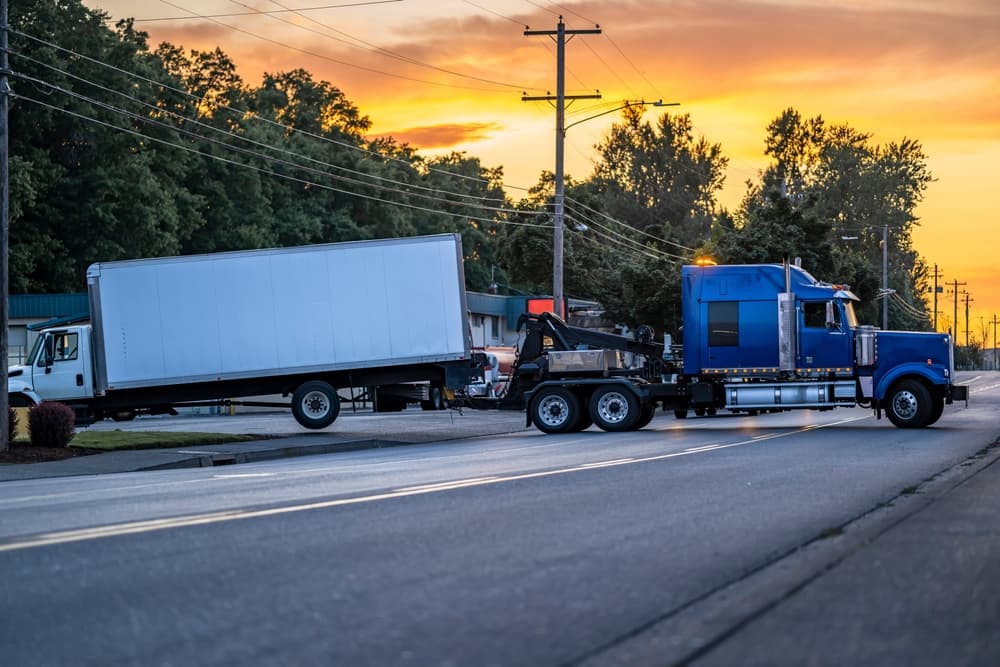After a traffic accident, you may be overwhelmed with what to do next and how to get compensation. Truck accidents are more complicated than typical accidents between two passenger vehicles. You may not even know what compensation you are entitled to after a truck accident.
There are two challenges to getting the money you need after a truck accident, determining liability and understanding damages. These challenges build upon each other because the damages available in a truck accident case are determined by who is liable for the accident.
To learn more about what an injured person can sue for in a truck accident case, continue reading. To discuss your accident and injuries, consult with a truck accident attorney in your area.
Common Causes of Truck Accidents

Truck accidents happen for many reasons. Every accident is unique, and one accident can have multiple causes. Here are some common causes of truck accident cases:
Blind Spots – A blind spot is the area of the road where it is hard or impossible for a driver to see drivers, cyclists, or pedestrians around them. Truck drivers have bigger blind spots than passenger vehicles. A truck accident may occur if you find yourself in a trucker’s blind spot.
Distracted Driving – Distracted driving happens whenever a driver takes their attention off driving. Examples of distracted driving include texting and driving, changing the music in the car, connecting to Bluetooth speakers, eating, speaking with passengers, disciplining children, or doing anything else that takes the driver’s eyes or attention off the road. Distracted driving is dangerous. According to the Centers for Disease Control and Prevention, nine people die every day across the country due to distracted drivers.
Impaired Driving – Driving under the influence of drugs or alcohol is a dangerous practice that leads to death. According to the National Highway Traffic Safety Administration, one person dies in a drunk driving accident every 45 minutes. Commercial trucks are large vehicles. Based solely on the size of the truck, there is potential for deadly consequences if a truck driver operates the vehicle while under the influence of drugs and alcohol.
Equipment Failure – Faulty equipment is a common cause of truck accidents. Most commonly, brake failure causes commercial trucks to break down and cause accidents. Large trucks already have a hard time stopping in traffic. If you add faulty brakes to an already existing problem with slowing down, the results are devastating.
Dangerous Cargo – If the bed or trailer of a commercial truck is improperly loaded, an accident may happen. An improperly loaded truck can lead to a driver losing control of the vehicle, tire blowouts, and rollover accidents.
Speeding – Truck drivers must follow the speed limit. Because of the size of commercial trucks, it is difficult for them to stop. It usually takes a commercial truck longer to stop than normal-sized passenger vehicles. Even if the truck was traveling at the posted speed limit, it still takes a long time to stop vehicles of this size. The speed at which the truck is traveling at the time of the accident increases the damage caused by the impact. A passenger vehicle that gets hit by a speeding truck may suffer permanent physical injuries and significant property damage.
Finding Fault in a Truck Accident Claim?
Getting compensation for injuries caused by a truck accident starts with finding each responsible party. A responsible party is a person, company, or other entity that may share fault for an accident. There may be many potentially responsible parties for causing a truck accident. Truck accident lawyers help accident victims find every responsible party in a truck accident claim.
Some potentially responsible parties for a truck accident include the following:
The Truck Driver – The person driving the truck is the most obvious person that has liability for causing the crash. Truck drivers may get into an accident for a long list of reasons. Because of the size of a truck and how long it takes for commercial trucks to come to a stop, accidents between trucks and passenger vehicles can have devastating results.
The Trucking Company – If the trucking company employs the truck driver, the company may share responsibility for the accident. Under the legal doctrine of respondeat superior, if an employee caused harm due to their negligence while doing their job, the employer is responsible for the damages the employee caused.
The trucking company is also responsible for properly training its drivers. A truck driver must have a commercial license to operate commercial trucks. There is a difference in license requirements because the skills required to drive a car differ from those required to operate a large commercial truck. Trucking companies may face liability for injuries caused after an accident if their drivers are not trained or do not have the proper licenses.
Manufacturers – Manufacturers may also share responsibility for causing an accident. Manufacturers must provide consumers with safe products. Those injured by defective products can sue negligent manufacturers for compensation. The manufacturer may be liable if the truck or its parts are defective.
Loaders – The trucking company’s employees may also share the blame for an accident. Many commercial trucks transport goods across the country. Employees load those goods. Unbalanced products may have caused the accident, and the truck company’s employees may be responsible for your damages.
Mechanics and Service Providers – Negligent service providers may also be responsible for an accident and, therefore, responsible for paying for your damages.
City or State Governments – It is the responsibility of cities and states to maintain safe roads. Unfortunately, city and interstate roads are often poorly maintained, resulting in cracks, potholes, and other obstructions. In the event of a truck accident caused by poorly maintained roads, the city or state government may also be liable. If you believe that the city or state government shares responsibility for your injuries, it is a good idea to consult an attorney for a truck accident in Florida.
Damages Available in Truck Accidents
Generally, three types of damages are available for individuals to recover: economic, non-economic, and punitive damages.
Economic Damages
Economic damages, also called special damages, are tangible, physical damages available as compensation for people injured in a truck accident. Economic damages repay injury victims for their measurable losses.
Examples of economic damages include:
- Medical bills, the cost of hospitalizations, and rehabilitation stays
- Property damage
- Lost wages
- Lost earning capacity
Non-economic Damages
Non-economic damages, also called general damages, are intangible damages available as compensation for injury victims. Non-economic damages address the mental, emotional, or non-physical losses from a truck accident and injuries.
Examples of non-economic damages include:
- Mental and emotional trauma
- Post-Traumatic Stress Disorder
- Loss of enjoyment of life
- Disfigurement
- Permanent or temporary disability
- Loss of companionship or loss of consortium
- Loss of motor or cognitive function
Non-economic damages address the intangible losses that economic damages cannot. Although many non-economic damages stem from physical harm, these are separate damages. A truck accident victim is entitled to receive each type of damage.
Non-economic damages can be difficult to prove. Truck accident victims that believe they have suffered any of the above losses should speak to an experienced truck accident attorney.
Punitive Damages
Punitive damages may also be available in truck accident cases. Punitive damages are an option for the court to punish a defendant for outrageous conduct. They do not relate to any of a victim’s damages. To learn if punitive damages are available in your case, you should speak to an experienced truck accident attorney.
What Are Some Common Injuries in Truck Accident Cases?
Every accident is unique, but some common injuries happen in truck accident cases. Common injuries in truck accident cases include:
Broken Bones
Truck accident crashes are severe and violent. The sheer weight of a commercial truck can cause a passenger vehicle to travel across the road and roll over. An accident victim can have multiple broken bones if they get into a crash involving a large truck. Broken bones can change a person’s life temporarily. A person may be unable to work or care for themselves, their children, aging parents, or other dependents.
Traumatic Brain Injuries, Concussions, and Other Brain Injuries
Even the least severe truck accidents can cause lasting head trauma. A traumatic brain injury (TBI) happens due to a major impact to the head. The victim might hit their head inside the car, or their head might quickly jolt forward and then back, causing a concussion. A person may not realize they have a concussion on their own. It is important to see a medical professional immediately after getting into a crash to avoid additional negative consequences associated with head injuries.
Neck and Spinal Cord Injuries
Neck and spinal cord injuries can cause total and permanent disability in the victim. A spinal cord injury can permanently affect the victim’s ability to walk, care for themselves, or live independently.
Internal Injuries
Always seek medical attention immediately after an accident, even if you have no visible injuries, as you may have internal injuries without knowing it. Doctors can only discover internal injuries, including internal bleeding, after a full medical examination and imaging tests. Not receiving treatment is often life-threatening.
Scarring and Burns
Truck accidents can leave victims with permanent injuries. Scarring and scars from burns can leave a person with a physical deformity. If you suffer scarring, you may never reach a place of maximum medical improvement.
Although you may never reach maximum medical improvement, you may still be entitled to compensation. Scarring and the scars caused by burns usually count toward non-economic damages. Disfigurement can lead to pain, suffering, or the loss of enjoyment of life. You cannot place a price tag on this kind of harm, but it is compensable, nonetheless.
Emotional Trauma and Mental Distress
The physical effects that truck accidents cause are clear, but the emotional trauma truck accidents cause can sometimes be much less obvious than the physical consequences. People in truck accidents may suffer from the long-term consequences of mental anguish and distress from being in the accident. This type of loss is usually hard to prove. Most accident victims that have claims related to mental and emotional trauma need an experienced attorney to help them get the compensation they deserve.
Wrongful Death Claims
Truck accidents are serious and often lead to the death of people traveling in passenger vehicles. If the accident results from negligence of the truck driver or the trucking company, then the relatives of the deceased victim may have a wrongful death claim.
Wrongful death law is state-specific. Many states limit who can sue for wrongful death.
Who may recover compensation from a lawsuit?
- The deceased’s spouse or domestic partner
- The deceased’s children
- The parents of the deceased
- The grandparents and siblings of the deceased
What you must prove in a wrongful death case depends on state law.
Typically, plaintiffs in a wrongful death case must prove:
- If the deceased survived the accident, they would be entitled to sue the wrongdoer for damages
- The plaintiffs are close family members with the right to bring the lawsuit for wrongful death
- The survivors suffered monetary damages as a result of losing the deceased’s income and support
Wrongful death cases compensate the deceased’s family for their losses and repay the losses the deceased would have recovered if they had survived the crash.
Plaintiffs in a wrongful death case may seek damages for:
- The loss of the deceased person’s income
- The loss of the deceased family member’s companionship and consortium
- Loss of guidance if the deceased person was a parent
What If I Cannot Afford an Attorney?

Most truck accident attorneys perform legal services on a contingency fee basis. A contingency fee is a payment structure that allows the deferral of payment until the end of a case. The attorney will receive fees only if the victim receives compensation for their losses. This arrangement allows all injury victims to have legal representation without needing up-front funds to cover legal fees and expenses.
There is no reason to wait in calling a Florida personal injury lawyer. Protect your rights. Start with a free case evaluation today.


